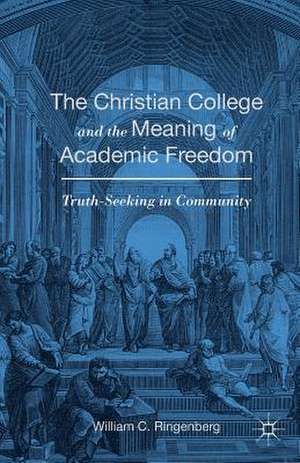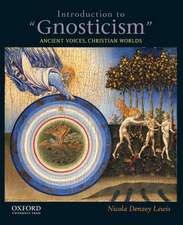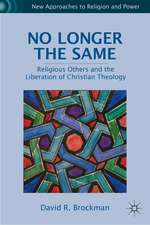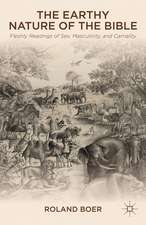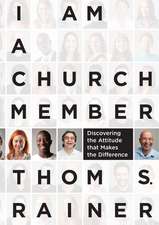The Christian College and the Meaning of Academic Freedom: Truth-Seeking in Community
Autor William C. Ringenbergen Limba Engleză Paperback – 15 mar 2018
William C. Ringenberg lays out the history of academic freedom in higher education in America, including its European antecedents, from the perspective of modern Christian higher education. He discusses the Christian values that provide context for the idea of academic freedom and how they have been applied to the nation's Christian colleges and universities. The book also dissects a series of recent case studies on the major controversial intellectual issues within and in, in some cases, about the Christian college community. Ringenberg ably analyzes the ways in which these academic institutions have evolved over time, outlining their efforts to evolve and remain relevant while maintaining their core values and historic identities.
| Toate formatele și edițiile | Preț | Express |
|---|---|---|
| Paperback (1) | 486.98 lei 6-8 săpt. | |
| Palgrave Macmillan US – 15 mar 2018 | 486.98 lei 6-8 săpt. | |
| Hardback (1) | 701.40 lei 6-8 săpt. | |
| Palgrave Macmillan US – 12 ian 2016 | 701.40 lei 6-8 săpt. |
Preț: 486.98 lei
Nou
Puncte Express: 730
Preț estimativ în valută:
93.20€ • 96.56$ • 77.78£
93.20€ • 96.56$ • 77.78£
Carte tipărită la comandă
Livrare economică 22 martie-05 aprilie
Preluare comenzi: 021 569.72.76
Specificații
ISBN-13: 9781349574575
ISBN-10: 1349574570
Pagini: 319
Ilustrații: XXII, 319 p. 35 illus.
Dimensiuni: 140 x 216 mm
Greutate: 0.4 kg
Ediția:1st ed. 2016
Editura: Palgrave Macmillan US
Colecția Palgrave Macmillan
Locul publicării:New York, United States
ISBN-10: 1349574570
Pagini: 319
Ilustrații: XXII, 319 p. 35 illus.
Dimensiuni: 140 x 216 mm
Greutate: 0.4 kg
Ediția:1st ed. 2016
Editura: Palgrave Macmillan US
Colecția Palgrave Macmillan
Locul publicării:New York, United States
Cuprins
Foreword; George Marsden
Preface
PART I: CHRISTIAN VALUES AS CONTEXT FOR THE IDEA OF ACADEMIC FREEDOM
1. Freedom
2. Seeking
3. Honesty
4. Humility
5. Courage
6. Prudence
7. Love
8. Meaning
9. Harmony and Balance
10. Community
PART II: THE DEVELOPMENT OF ACADEMIC FREEDOM IN AMERICA: A CHRISTIAN COLLEGE INTERPRETATION
11. The English Model: Anglican Dominance
12. The German Model: Secular Dominance
13. The Early American Model: Protestant Dominance
14. The Later American Model: Secular Hegemony
15. The Modern Christian College Model
16. Institutional Academic Freedom
17. Student Academic Freedom
18. Economic Limits as Academic Limits: The Problem of Accessibility
19. Evangelicals and Catholics: Narrowing the Gap
PART III: TESTING THE LIMITS: RECENT CASE STUDIES IN CHRISTIAN HIGHER EDUCATION
20. The Origins Debate (I)
21. The Origins Debate (II)
22. Sexual and Gender Identity (I)
23. Sexual and Gender Identity (II)
24. College and Church: Complement and Conflict
25. Theological Nuance
26. Gender, Race, and Ethnicity
27. Secular University Restrictions and Their Broader Implications
28. Government Restrictions and Accreditation Uncertainties
29. Due Process
Epilogue
Bibliography
Preface
PART I: CHRISTIAN VALUES AS CONTEXT FOR THE IDEA OF ACADEMIC FREEDOM
1. Freedom
2. Seeking
3. Honesty
4. Humility
5. Courage
6. Prudence
7. Love
8. Meaning
9. Harmony and Balance
10. Community
PART II: THE DEVELOPMENT OF ACADEMIC FREEDOM IN AMERICA: A CHRISTIAN COLLEGE INTERPRETATION
11. The English Model: Anglican Dominance
12. The German Model: Secular Dominance
13. The Early American Model: Protestant Dominance
14. The Later American Model: Secular Hegemony
15. The Modern Christian College Model
16. Institutional Academic Freedom
17. Student Academic Freedom
18. Economic Limits as Academic Limits: The Problem of Accessibility
19. Evangelicals and Catholics: Narrowing the Gap
PART III: TESTING THE LIMITS: RECENT CASE STUDIES IN CHRISTIAN HIGHER EDUCATION
20. The Origins Debate (I)
21. The Origins Debate (II)
22. Sexual and Gender Identity (I)
23. Sexual and Gender Identity (II)
24. College and Church: Complement and Conflict
25. Theological Nuance
26. Gender, Race, and Ethnicity
27. Secular University Restrictions and Their Broader Implications
28. Government Restrictions and Accreditation Uncertainties
29. Due Process
Epilogue
Bibliography
Recenzii
"This book is timely and badly needed. It is fair, balanced, thoughtful, and discerning. It provides wise counsel to those responsible for the protection of academic freedom in both Christian and secular academies." - Anthony Diekema, President Emeritus, Calvin College (1976-95), USA, and author, Academic Freedom and the Christian College
'This is a well-conceived project by one of the most seasoned scholars to study Christian higher education in the past generation. The book has the added benefit of Ringenberg's clear and felicitous prose, his ability to weave story and ideas into a readable narrative, his sense of balance, fairness, and Christian charity. A very helpful book for anyone interested in academic freedom in the Christian college world.' - Barry Hankins, Professor of History and Director of Graduate Studies, Department of History, Baylor University, USA
"This book is helpful not just for scholars in Christian colleges but also for those in secular universities. With clear style, lucid histories, and riveting case studies, Ringenberg argues for an understanding of academic freedom that can draw together scholars from different types of institutions when they value intellectual humility and are interested foremost in seeking truth." - Philip Goff, Director, Center for the Study of Religion and American Culture, IUPUI, USA
"This is a comprehensive, carefully-researched, and thoughtfully written work. Scholars, policy-makers, faculty and administrators, and all those who want to be more fully informed about this branch of higher education will find this work an absolutely essential part of their library. Some of what you may believe to be true about Christian higher education will certainly be challenged. And that is a good thing." - Ronald Mahurin, Vice President for Strategy and Planning, Stamats Higher Education Consulting, USA
'This is a well-conceived project by one of the most seasoned scholars to study Christian higher education in the past generation. The book has the added benefit of Ringenberg's clear and felicitous prose, his ability to weave story and ideas into a readable narrative, his sense of balance, fairness, and Christian charity. A very helpful book for anyone interested in academic freedom in the Christian college world.' - Barry Hankins, Professor of History and Director of Graduate Studies, Department of History, Baylor University, USA
"This book is helpful not just for scholars in Christian colleges but also for those in secular universities. With clear style, lucid histories, and riveting case studies, Ringenberg argues for an understanding of academic freedom that can draw together scholars from different types of institutions when they value intellectual humility and are interested foremost in seeking truth." - Philip Goff, Director, Center for the Study of Religion and American Culture, IUPUI, USA
"This is a comprehensive, carefully-researched, and thoughtfully written work. Scholars, policy-makers, faculty and administrators, and all those who want to be more fully informed about this branch of higher education will find this work an absolutely essential part of their library. Some of what you may believe to be true about Christian higher education will certainly be challenged. And that is a good thing." - Ronald Mahurin, Vice President for Strategy and Planning, Stamats Higher Education Consulting, USA
Notă biografică
William C. Ringenberg is Professor of History emeritus at Taylor University, USA. He is also a past president of the Conference on Faith and History, and an associate research fellow at the Center for the Study of Religion and American Culture. His major work is The Christian College: A History of Protestant Higher Education in America.
Textul de pe ultima copertă
The Christian College and the Meaning of Academic Freedom is a study of the past record and current practice of the Protestant colleges in America in the quest to achieve intellectual honesty within academic community.
William C. Ringenberg lays out the history of academic freedom in higher education in America, including its European antecedents, from the perspective of modern Christian higher education. He discusses the Christian values that provide context for the idea of academic freedom and how they have been applied to the nation's Christian colleges and universities. The book also dissects a series of recent case studies on the major controversial intellectual issues within and in, in some cases, about the Christian college community. Ringenberg ably analyzes the ways in which these academic institutions have evolved over time, outlining their efforts to evolve and remain relevant while maintaining their core values and historic identities.
William C. Ringenberg lays out the history of academic freedom in higher education in America, including its European antecedents, from the perspective of modern Christian higher education. He discusses the Christian values that provide context for the idea of academic freedom and how they have been applied to the nation's Christian colleges and universities. The book also dissects a series of recent case studies on the major controversial intellectual issues within and in, in some cases, about the Christian college community. Ringenberg ably analyzes the ways in which these academic institutions have evolved over time, outlining their efforts to evolve and remain relevant while maintaining their core values and historic identities.
Caracteristici
Discusses the Christian values which provide context for the idea of academic fredom. Presents a history of academic freedom in higher education in America. Uses a series of case studies to illustrate the points.
